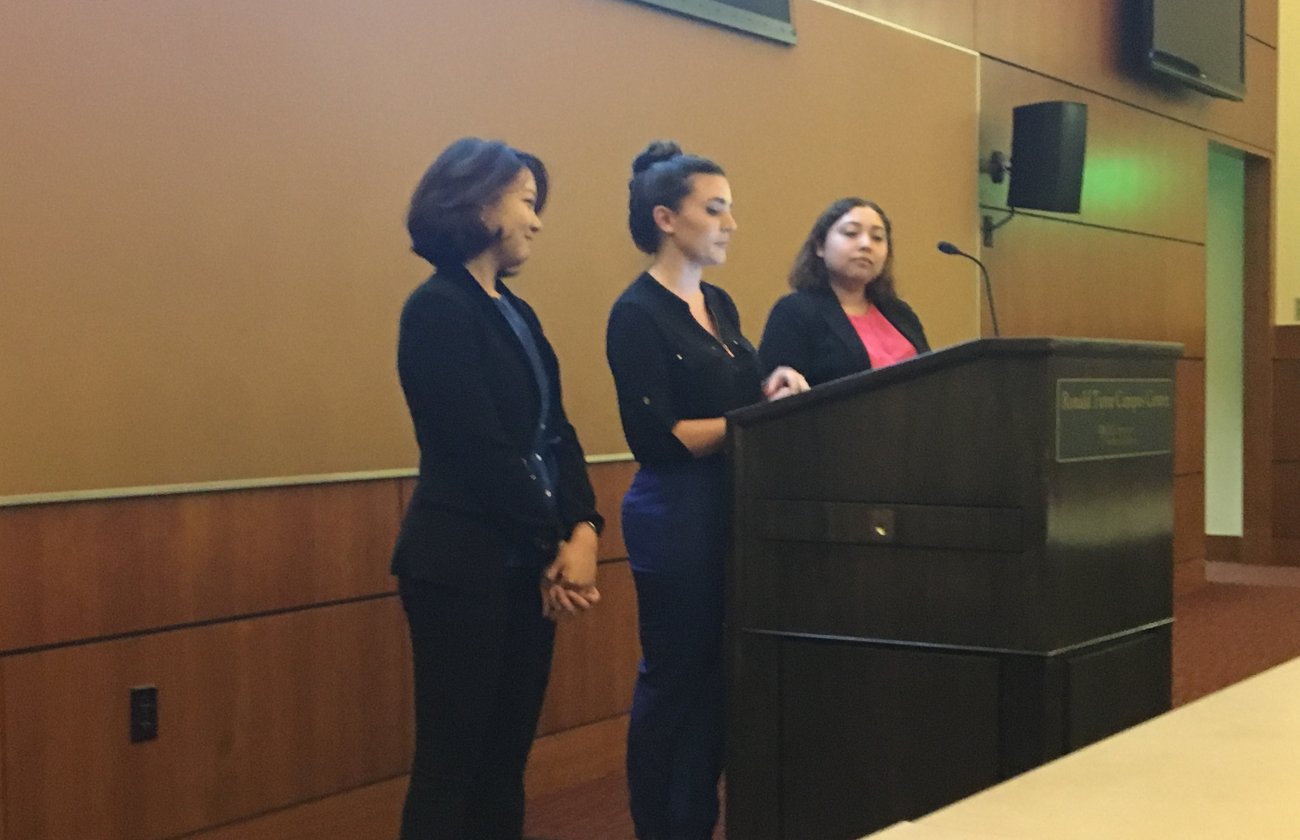By Amelia Brodka
Student Writer
Student Writer
The LA Times' series of investigations pursued by the “Bell Team” unveiled immense corruption in the government of the humble city of Bell, California. The information found by journalists Jeff Gottlieb (pictured, below right) and Ruben Vives (pictured, below left) has generated a ripple effect, drawing heightened citizen and media attention to the inner workings of local governments far beyond Southern California.
On Friday, Mar. 25, USC Annenberg presented Times journalists Jeff Gottlieb and Ruben Vives with the Selden Ring Award for Investigative Reporting, a $35,000 annual award that honors the year’s outstanding work in investigative journalism that led to direct results. For the past 22 years, the prize has been awarded by USC Annenberg.
A day earlier, the school’s Journalism Director's Forum welcomed Gottlieb and Vives, along with fellow Times journalists Paloma Esquivel and Hector Becerra, to tell the story behind the story of the Bell City scandals.
 The series of stories about Bell's plundering government officials “changed the culture of newspapers,” Becerra said. Upon reading about the absurdly high wages earned by part-time Bell City officials, “every editor in every paper in nowheresville turned to their city hall reporter and said: 'go find out how much the city council makes,'” said Becerra. “This scandal made the public wonder, ‘Are there other cities like Bell?’.”
The series of stories about Bell's plundering government officials “changed the culture of newspapers,” Becerra said. Upon reading about the absurdly high wages earned by part-time Bell City officials, “every editor in every paper in nowheresville turned to their city hall reporter and said: 'go find out how much the city council makes,'” said Becerra. “This scandal made the public wonder, ‘Are there other cities like Bell?’.”“There was a sense that something was wrong in Bell but no one could quite get their hands on it,” said Gottlieb, explaining the motivation behind the initial investigation.
The story began in the neighboring town of Maywood, Gottlieb explained. As the town neared bankruptcy, officials decided to fire Maywood city workers and outsource municipal services to the city of Bell. At the time, Maywood was unaware they were contributing to the Bell city officials' already exaggerated wages.
In covering the changes taking place in Maywood, Vives caught wind of the fact that Bell City Council members were making around $100,000 a year. Knowing the typical wage for this part-time position is $8,000, Vives and Gottlieb decided to investigate. They struggled to arrange a meeting with a hesitant Robert Rizzo, Bell's administrator.
Rizzo agreed to meet Vives and Gottlieb in Little Bear Park. He arrived with attorneys, city council members, city clerks and even councilmen from Maywood. During the four-hour meeting, Gottlieb inquired about Rizzo's annual wage.
“Rizzo admitted to making $700,000, which was so much money, I didn't think I heard him right,” said Gottlieb.
 “When I heard that, I said quietly, but just loudly enough to hear, 'Jesus Christ,'” added Vives. After carefully calculating years’ worth of paperwork, Gottlieb discovered that Rizzo was making $787,637 on contract, but in actuality raking in $1.5 million with 26 weeks of paid vacation.
“When I heard that, I said quietly, but just loudly enough to hear, 'Jesus Christ,'” added Vives. After carefully calculating years’ worth of paperwork, Gottlieb discovered that Rizzo was making $787,637 on contract, but in actuality raking in $1.5 million with 26 weeks of paid vacation.As these journalists pursued their investigation of Bell, they discovered that the majority of city officials were receiving grossly inflated wages as well.
“I thought it was a gift from God,” said Bell's pastor upon opening his first check, recalled Vives. Gottlieb mentioned a police officer who 'retired' from the big city of Glendale to work in little Bell and watched his income rise from $215,000 to $457,000.
“Every time we went to do a story, we came back with three more stories. When is it going to end?” said Gottlieb, discussing the depth and intricacy of Bell city's tainted inner workings. He discussed the need to follow the most obscure tips, given to his reporting team by “people collecting recyclables” or “selling ice cream in the streets.”
“The most bizarre things ended up being true!” Gottlieb said.
Gottlieb and Vives unraveled the workings behind the inflated salaries of the part-time city council members. Their annual base salary of $1,800 had grown to $96,000, due to their participation in boards and city agencies such as the Community Redevelopment Agency, the Community Housing Authority, the Surplus Property Authority, the Planning Commission and more. However, upon further inspection, Gottlieb and Vives discovered that the majority of these boards often had meetings that either took place during regular council meetings or lasted a minute each.
“It wasn't just the high salaries,” Gottlieb told the crowd of Annenberg students and faculty, as he explained that the residents of Bell, the third poorest town in LA County, were “screwed” in more ways than one. “Residents were charged with the second highest property tax in LA County, along with illegal property taxes and fees.” Rizzo even took out loans as high as $95,000 and used city funds to pay them back.
“The first story appeared on a Thursday and there was a council meeting on Monday,” Vives described the scene after the first Bell story was published. As he arrived to cover the council meeting, Vives expected the typical five residents to be present. “The entire city was outside of city hall, media included,” said Vives. The enormous, angry crowd had “been trying to figure out what was wrong for years.”
The findings of these Selden Ring-winning journalists have created an impact beyond the little town of Bell. Not only are “residents waking up, keeping an eye on and participating in the government,” but the Bell findings have provoked Sacramento lawmakers to work on a series of bills to prevent city managers from following Rizzo's footsteps.
Eight current and former Bell officials have been charged with misappropriation of city money. Robert Rizzo is facing over 50 felony charges.









